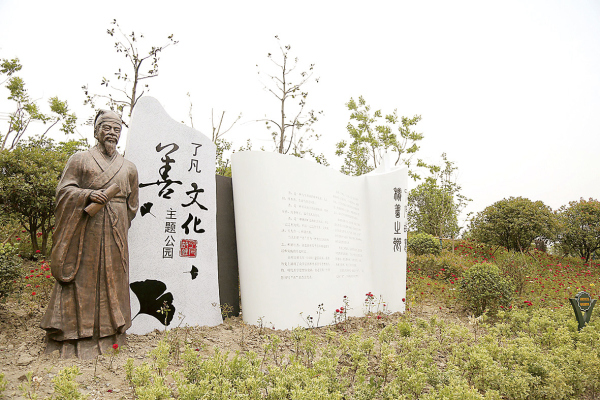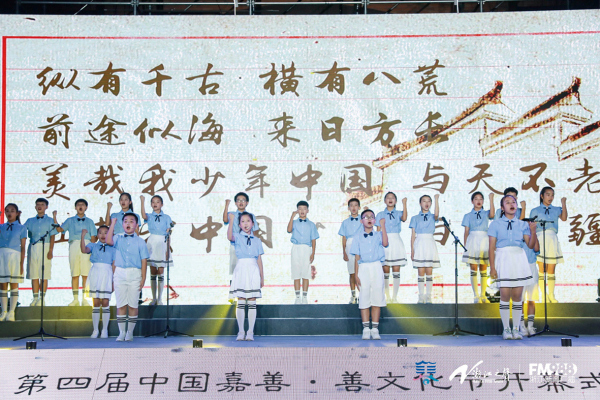
The history of Jiashan could be traced back to the Majiabang culture, over 5,800 years ago. As early as 1,800 years ago, the Ciyun Temple was built in the area of Weitang. During the Northern and Southern Dynasties (420-589), the Huating Pond was opened, and people began to move in and settle down here, and it gradually turned into a lively town in the Song dynasty (960-1279). It is on this fertile land that Jiashan ancestors have been working with full diligence and living in peace for thousands of years.
Yet it was not until the Xuande period of the Ming dynasty (1368-1644) that this land was officially named Jiashan. The name came in late, but it was a perfect fit. The “Jia” in Jiashan represents a town called Jiaxing, and the “Shan” means goods, which is the cultural core and the moral gene inherited by Jiashan people for generations. Goodness is written in the local literature and shown through the good deeds of charities and villagers. It has further become the common value of Jiashan people who “act with goodness in heart”, “learn the goodness by heart” and “promote the concept of goodness”. It has also given rise to Jiashan’s cultural brand and injected strong spiritual power in building itself into a model.

According to what is shown by the Majiabang cultural relics, the transformation of Jiashan’s shallow bay into a swamp had been completed during the Neolithic period, providing necessary conditions for people’s production and living at that time.
Jiashan has a well-developed water system. Running across the entire county are 542 rivers, large and small, totaling 1,694 kilometers. Living water-side, the local people here are naturally gentle and generous in character. And the plain terrain of Jianshan is another prerequisite enabling the development of farming.
Back to the Majiabang culture over 6,000 years ago, the ancestors of Jiashan were already engaged in rice farming. After the Sui and Tang dynasties, Jiashan has become an important national granary. Jiashan’s historical, cultural and geographical characteristics have shaped its folks into a crowd of modesty, courtesy, benevolence, and tolerance. They are also excellent learners and thinkers, some of whom are the best humanistic and scientific minds in China.
The gradual formation of “goodness culture” in Jiashan is featured by continuous researching and practicing of the concept “goodness”. Among those pioneers, Ding Bin (1543-1633), Yuan Liaofan (1533-1606), Wei Dazhong (1575-1625) and Chen Longzheng (1585-1645) from the Ming and Qing (1616-1911) dynasties, are worth mentioning for their impressive interpretations of “Jiashan good deeds”. This has made Jiashan culture stand out from the Wu-Yue culture as a unique regional culture.
Ding Bin was the first official in history to make an all-out donation. He not only donated all of his ancestral properties; he even borrowed money to help the villagers,while he himself was quite frugal and lived a simple life like an ascetic.
Yuan Liaofan, also known as Yuan Huang, was an advocate of the goodness movement in Jiangnan (south of the Yangtze River) and the author of Liaofan Si Xun, or Liaofan’s Four Lessons,a classic on the goodness in China. He advocated the use of “merit and demerit” to exercise moral self-discipline and regulate one’s own behavior, so as to achieve the purpose of self-cultivation and perfection of life.
Chen Longzheng was a practitioner of the good-deed movement. He devoted himself to easing the after-calamity dilemma for his folks, for which purpose he established the Tongshan Guild Hall in Jiashan as a permanent institution and public office for running good deeds, and in helping the poor all year round. It was the first private charity organization in Jiangnan and is of epoch-making significance in the history of Chinese folk charity. It is also the prototype of modern Chinese charitable organizations. As for Wei Dazhong and his son Wei Xueyi (1596-1625), they are the representative figures of loyalty and filial piety.
In Jiashan, the “goodness culture” is not only the moral standard of the scholar-officials but also runs through the simple actions and folk tales of the local people. Jiashan people always honor the honest officials, martyrs, and those who have done good deeds for the county as the “city gods”, hoping their soul will protect local people’s safety and their spirit of goodness could be passed down for generations.

In recent years, Jiashan has elevated its culture to the same important position as its economy. The “goodness culture” has provided strong spiritual support for the social and economic development of the county. It has become a source of the county’s soft power and a strong motivation promoting Jiashan’s development.
While exploring the way from “good administration to good governance”, Jiashan government has been innovatively breaking through the barriers of institutional mechanisms. The good governance in Jiashan has well balanced the economic strength, governance capacity, development speed, and governance effectiveness by continuously improving governance concepts, policies, and methods. It is a new model of county practice for promoting a modern governance system and governance capacity.
The government has also made great efforts to create the best business environment featuring “goodness”, which embodies the concepts of freedom, equality, efficiency, and integrity. It has also been striving to improve the environment so that local people are able to live in peaceful harmony with nature. For more than ten years, the Jiashan government has been promoting industrial restructuring, eliminating outdated and inefficient projects, restoring the ecosystem, and building a beautiful county.
And Jiashan’s overall upgrading and brand rebuilding continue. The county will make every effort to highlight its “goodness culture”, while improving the wellbeing of its people, cultivating its soft power, unleashing its new charm and revitalizing its industry. It is now walking towards a promising future.

Spring in Xitang. (Photo/Quan Mintao).





